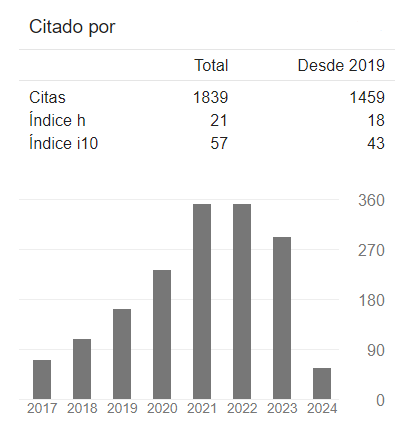Emociones y su influencia en la toma de decisiones: cuestiones seleccionadas
DOI:
https://doi.org/10.24142/raju.v18n37a7Palabras clave:
emociones, toma de decisiones, ley, estudio de caso, derecho penalResumen
El objetivo de este artículo es presentar la correlación entre la toma de decisiones y la influencia de las emociones en este proceso. Es relevante tanto para las situaciones cotidianas como para el ámbito legal. Por eso, en el trabajo se presentarán los resultados de una investigación propia relacionada con la toma de decisiones por parte de abogados y personas que practican una profesión distinta a la ley en el campo del derecho penal, basándose en un caso de estudio preparado. La investigación se llevó a cabo mediante la aplicación del instrumento de encuesta.
Citas
American Psychological Association (APA). (2023a). Decision making, APA Dictionary of Psychology. https://dictionary.apa.org/decision-making
American Psychological Association (APA). (2023b). Emotion, APA Dictionary of Psychology. https://dictionary.apa.org/emotions.
Baron, J. (2012). The point of normative models in judgment and decision making. Front. Psychology, (3), 577. https://www.frontiersin.org/articles/10.3389/fpsyg.2012.00577/full.
Cohn, M. A., Fredrickson, B. L., Brown, S. L., Mikels, J. A. y Conway, A. M. (2009). Happiness unpacked: Positive emotions increase life satisfaction by building resilience. Emotion, 9(3), 361-368 https://www.ncbi.nlm.nih.gov/pmc/articles/PMC3126102/.
Côté-Lussier, C. y David, J.-D. (2023). Intuitive anger in the context of crime and punishment. Psychology, Crime & Law, 29(5), 465-487. https:// www.tandfonline.com/doi/abs/10.1080/1068316X.2022.2027946.
Critchley, P. (2018). Autonomy, authenticity and authority: The rational freedom of Jean-Jacques Rousseau. Humanities commons. Based on commons in a BOX. https://hcommons.org/deposits/item/hc:19891/.
D?browski, A. (2015). Emotions and decision-making processes. En A. D?browski, A. Schumann y J. Wole?ski (Eds.), Decision making-concepts, theories, controversies, Kraków (pp. 235-261). https://www.academia.edu/36167745/Emocje_a_procesy_decyzyjne.
Fredrickson, B. L. (2002). Positive emotions. En S. López, C. R. Snyder, L. Edwards y S. Marques (Eds.), The Oxford handbook of positive psychology (pp. 120-134). Oxford University Press.
Ga?uszka, A. (2022). Emotion-their meaning and tasks. Journal of Education, Health and Sport, 12(1), 147-159.
Gu, S., Wang, F., Patel, N. P., Bourgeois, J. A. Y Huang, J. H. (2019). A model for basic emotions using observations of behavior in Drosophila. Frontiers in Psychologia, (10), 781.
Holska, A. M. (2016). Theories of decision-making. En K. Krzysztof (Ed.), Management, organizations and organizing. A review of theoretical perspectives. Warsaw.
Keltner, D., Oatley, K. y Jenkins, J. (2014). Understand emotions. John Wiley & Sons. https://vdoc.pub/documents/understanding-emotions-7jba5ueeimt0.
?abuz, A. (2019). The decision-making process on the example of the purchase of new computer equipment. Studies and Works, (59), 119-130. https://wnus.usz.edu.pl/sip/en/issues/.
LeDoux, J. E. (1998). The emotional brain. The mysterious underpinnings of emotional life. Simon & Schuster.
Lerner, J., Li, Y., Valdesolo, P. y Kassam, K. (2015). Emotion and decision making. Annual Review of Psychology, 66, 799-823.
Mayer, J. D., Caruso, D. R. y Salovey, P. (2016). The ability model of emotional intelligence: Principles and updates. Emotion Review, 8(4), 290-300. https://doi.org/10.1177/1754073916639667.
Newell, A. y Simon, H. A. (1972). Human problem solving. Prentice-Hall. https://learnlab.org/wiki/images/1/1d/Human_Problem_Solving. pdf.
Paternoster, R., Jaynes, C. M. y Wilson, T. (2017). Rational choice theory and interest in the “Fortune of Others”. Journal of Research in Crime and Delinquency, 54(6), 847-868. https://ccjs.umd.edu/sites/ccjs.umd.edu/files/pubs/1compliant-Rational%20Choice%2C%20Paternoster.pdf o https://doi.org/10.1177/0022427817707240.
Plutchik R., (1970). Emotions, evolution, and adaptive processes. En
M. B. Arnold (Ed.), Feelings and emotions. The Loyola Symposium (pp. 3-24). Academic Press. https://shop.elsevier.com/books/feelings-and-emotions/arnold/978-0-12-063550-4.
Quigley, B. M. y Tedeschi, J. T. (1996). Mediating effects of blame attributions on feelings of anger. Personality and Social Psychology Bulletin, 22(12), 1280-1288. https://doi.org/10.1177/01461672962212008.
Reeve, J. (2009). Motivación y emoción. McGraw-Hill/Interamericana Editores. https://clea.edu.mx/biblioteca/files/original/22488921e36d90caeef3d8973d805dcb.pdf.
Samuelson W. F. y Marks S. G., (2012). Managerial economics. John Wiley & Sons. http://www.mim.ac.mw/books/Samuelson%20Managerial%20Economics%207e.pdf.
Schwarz, N. (1990). Feelings as information: Informational and motivational functions of affective states. En E. T. Higgins y R. M. Sorrentino (Eds.), Handbook of motivation and cognition: Foundations of social behavior (vol. 2, pp. 527–561). The Guilford Press.
Sirois, B. C. y Burg, M. M. (2003). Negative emotion and coronary heart disease: A review. Behavior Modification, 27(1), 83-102. https://pubmed.ncbi.nlm.nih.gov/12587262/.
Verweij, M., Senior, T. J., Domínguez, D. Y Turner, R. (2015). Emotion, rationality, and decision-making: How to link affective and social neuroscience with social theory. Frontiers in Neuroscience, 9, 332. 10.3389/fnins.2015.00332. https://www.frontiersin.org/articles/10.3389/fnins.2015.00332/full.
Descargas
Publicado
Cómo citar
Número
Sección
Licencia
Derechos de autor 2023 Katarzyna Witek-Mioduszewska

Esta obra está bajo una licencia internacional Creative Commons Atribución-NoComercial-CompartirIgual 4.0.
La rivista consente all'autore (s) di mantenere i diritti di pubblicazione senza restrizioni.
Le journal permet à l'auteur (s) de conserver les droits de publication sans restrictions.
The journal allows the author (s) to retain publication rights without restrictions.
La revista le permite al autor(es) retener los derechos de publicación sin restricciones
Die Zeitschrift ermöglicht es dem / den Autor (en), Veröffentlichungsrechte ohne Einschränkungen zu behalten.
A revista permite que os autores mantenham os direitos de publicação sem restrições.










































